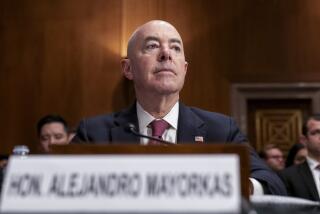PATHWAY TO PERIL
- Share via
IT IS THAT RAREST of political dramas: the impeachment of a president by the House of Representatives and his trial by the Senate. And it took an extraordinary confluence of people, forces and events to make Bill Clinton the third president in the republic’s 210 years to face the Constitution’s ultimate threat.
Unlike the impeachment of Andrew Johnson in 1868, no nation-rending conflict gave rise to the present crisis. Unlike the move to impeach Richard Nixon in 1974, no blatant criminal conspiracy lay spread upon the record.
Instead, this is the story of a man whose exceptional public talents are intertwined with destructive personal traits --a man who delivered himself into the hands of opponents so determined that they would press ahead in the face of overwhelming public opposition.
Rhodes scholar, Yale Law School graduate, state attorney general and five-term governor of Arkansas, twice elected president, a leader who revived a faltering Democratic Party and turned back a Republican resurgency, Clinton could lay claim to being the master politician of his generation.
Never far below the surface, however, lurked the stuff of Greek tragedy: a seemingly obsessive desire to pursue women, combined with an impulse to deny and deceive when cornered.
It almost seemed to be in his blood. The man Clinton calls his father, William Jefferson Blythe II, who died in an auto crash before Clinton was born, had married and abandoned several women before marrying Clinton’s mother, Virginia--a tangled history he concealed from her until his death. Similarly, the president’s stepfather, Roger Clinton, an abusive alcoholic, also had an eye for other women and concealed the fact that he had a wife and child at the time he wooed Clinton’s mother.
Virginia Kelley herself, married four times before her death in 1994, was a hard-working nurse anesthetist by day but a flirtatious, nightclub-loving woman by night. Some researchers have even questioned whether Blythe, who served overseas in the Army during part of World War II, was Clinton’s biological father.
Then there are Clinton’s enemies.
Perhaps no political leader in recent U.S. history has aroused such enmity. It stems from more than policy differences, more than envy of his skyrocketing career. For many, there is moral revulsion: an abhorrence not only of his conduct but also of his preaching of personal responsibility even as he tries to evade the consequences of his own actions.
Perhaps no political leader in recent U.S. history has aroused such enmity. Many feel a moral revulsion, not only at his conduct but also at his preaching of personal responsibility even as he tries to evade the consequences of his own actions. They see an ethical bankruptcy in which he feels no obligation to the truth in either his personal or his political life.
For these critics at least, Clinton embodies a permissive 1960s lifestyle. As one conservative commentator put it, independent counsel Kenneth W. Starr “was not just prosecuting Bill Clinton; he was prosecuting the entire culture that gave birth to what Bill Clinton represents.”
Exposure of Clinton’s personal conduct would have disgraced his name under any circumstances. But it is unlikely he would have found himself one step away from removal from office if he had not aroused such animus.
Even so, there were many chances to avoid this crisis, moments when restraint, full disclosure or trust could have prevailed. In those missed moments--in the failure to stop the larger forces of history--is written the dark tale of impeachment.
More to Read
Sign up for Essential California
The most important California stories and recommendations in your inbox every morning.
You may occasionally receive promotional content from the Los Angeles Times.















